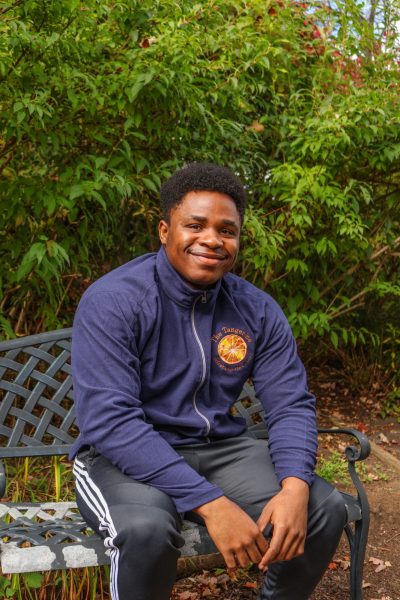‘You just want to be you’: How Utica’s Q Center provides hope for LGBTQ youth
Poster from inside the Utica Q Center with the message “Love Wins.”
May 12, 2023
A record 474 anti-LGBTQ bills have been issued across the United States by state legislators this year alone, according to data from the American Civil Liberties Union. Many of them propose bans on medical and gender affirmation care for LGBTQ youth in the U.S.
The ACLU tracked 222 schools and education bills that prevent trans youth specifically from participating in school activities, along with censoring LGBTQ-related topics.
The Q Center at ACR Health, with locations in Utica, Syracuse, and Watertown offers weekly and biweekly support groups for kids ages 10 to 25 in the Utica area.
The Center also hosts support groups for parents and caregivers of trans and gender-expansive youth along with collaborating with schools and universities in the surrounding area to provide training and school-based gender and sexuality technical assistance.
The mission of the center is to provide safe and supportive spaces for LGBTQ youth and their families as it aims to cultivate a sense of pride and leadership in young people.
However, its purpose is to create safer communities for LGBTQ individuals of all ages by decreasing social isolation and increasing social support.
“We do that through education [and] providing cultural competency training to pretty much anyone who asked for it,” said Hilary Avallone, ACR Health LGBT Program Manager. “That provides an educational experience for people to learn about gender and sexuality.”
For a long time the safe places in communities were bars, Avllaone said, causing high rates of alcohol and tobacco usage within the LGBTQ community.
According to The Trevor Project, 56% of LGBTQ youth used alcohol in the last year with 47% of them registering under the age of 21.
The Q Center not only provides equitable and inclusive places for LQBTQ youth but also creates a different alternative for people to express themselves in a substance-free setting.
“Having spaces outside of bars that can help to build pride and foster community and self-acceptance can really do a lot for a person over the course of a lifetime,” Avallone said. “That’s sort of why we do what we do because some people don’t have other places where they get to be themselves.”
In addition, the Q Center offers other resources ranging from after-school programs, free confidential HIV/STD testing, and services to help individuals navigate trans-related healthcare.
Jacqueline Pilon, youth support group volunteer, said the Q Center provides extensive resources for youths.
“Whether it be the hygiene care closet that you can get, emergency housing [or] groups that are teaching life skills. The scope of services to help make sure the youth and young adults can strive is just immense,” Pilon said. “And the variety of groups and programs that they offer is simply what hits each person.”
For the youth themselves the Q Center provides much more than a safe place—but also a peace of mind.
“I’ve been coming to the Q Center for years and it has really helped me grow and find myself over the years,” one member said when asked what the Q Center means to them. “The staff here is amazing and really made me feel at home and comfortable with who I am.”
For some parents, the Q Centers support system for all ages makes everyone feel equally welcomed.
“Because [our daughter] was so young when she came out as trans, that was the closest place we found that really offered guidance and support,” one parent said.
Giving back and navigating through life is a big part of what the Q Center means to some.
But on a deeper level to Q Center Coordinator Soren Shirley — it means hope.
“Hope that the world can get better and hope that all this discrimination against people who just want to be them stops,” Shirley said. “I know that’s a lot to wish for but you just want to be you and people are mean and bitter for whatever reason and that sucks.”
As anti-LGBTQ legislation in health care and education becomes increasing across states in the U.S., the Q Center intends to still be the hope that people need to break those barriers.
“The goal of the job is to work yourself out of a job,” Avallone said. “If the Q Center didn’t have to exist that would be amazing because that means that they don’t need to have a safe place to exist [because] the entire world is a safe place.”





































































































































